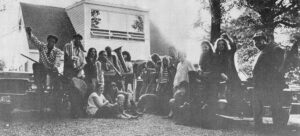
Last Saturday night, Bonnie Raitt and Willie Nelson supplied one very good reason to vote for Dennis Kucinich for president: bringing those two to D.C. to sing duets at the inauguration. Among many other tunes, the headliners delivered an engaging version of “Getting Over You” Saturday night at the Austin Music Hall, as the Kucinich forces wrapped up a two-day local tour, during which the candidate filed for the Texas primary, raised money, fired up his supporters, and spoke out for peace on the steps of the Capitol. Indeed, “Peace” was the keynote of the weekend, not only in the new campaign song by Nelson, “Whatever Happened to Peace on Earth?” — composed, he said, on Christmas Day — but in the dominating theme of the candidate’s talks throughout his visit. “I am going to make the war in Iraq the defining issue of this race,” Kucinich told reporters after a Saturday morning forum at the Texas AFL-CIO headquarters on Lavaca.
Although the candidate addressed other issues — abandoning the World Trade Organization and NAFTA, establishing a national single-payer health plan, fighting for social and economic justice — by his own insistence it is the war that is driving his campaign. “We were wrong to get in, and it is wrong to stay,” Kucinich said. “And the longer we stay, the deeper we’re going to get involved — it will become another Vietnam.” Moreover, he argued, the war has already distorted national priorities and will make it increasingly difficult to sustain the financial effort necessary to do the other things on the agenda: revive the economy, create jobs, rebuild the infrastructure, expand education and health care — all those promises the candidates recite but will find very difficult to deliver.



Kucinich delivered variations on this theme throughout the weekend. At a Friday night fundraiser at Barr Mansion, in between the mellow singer-songwriters and the catered food, he noted the Garden of Eden motif of the remodeled barn’s mural and launched into an evocation of humanity’s “interconnectedness and interdependence.” He described his campaign as a means of fulfillment of “this commitment we are making to each other,” and noted the new year’s urgency to “assert the claims of all humanity for peace, for hope,” and the desire to “merge with all of creation.” If the rhetoric seemed more than a little heady for a political campaign, it was entirely in keeping with the decor, the local expressions of not-so-haute couture, and the constellation of stars that have gathered around Kucinich as the peace candidate. (Actors Mimi Kennedy and James Cromwell were prominent throughout the weekend, and among several others joining Nelson and Raitt on stage were Michelle Shocked, Tish Hinojosa, Kim Wilson, and Michael McDonald. If nothing else, Kucinich can surely lay claim to the All-Star Entertainer endorsements.)
At Saturday morning’s labor forum, Kucinich was a good bit less abstract, noting his own longtime union membership as well as his consistent opposition to international trade policies that he called responsible for both U.S. job losses and environmental degradation. “I’m not just a missionary to labor — I come from the House of Labor,” he said. “And when I’m president, I’ll cancel the WTO and NAFTA and return to bilateral trade relations that protect labor standards and environmental standards. … If you vote for me, you’re not just settling for what you can get — not just winning an election, but putting a brother in the White House.”
Kucinich is proud of being “the only candidate who has actually voted against this war,” and roundly rejects the notion that his policies or his campaign are exercises in idealism. The only honest response to an immoral war, he insists, is U.S. withdrawal and turning the operation over to the United Nations and the Iraqis as soon as possible. He repeated that message on the Capitol steps Saturday afternoon to a surprisingly large and enthusiastic holiday crowd of nearly 1,000 people. “We are here because we disagree with those who insist that war is inevitable,” he declared. “We believe that peace is inevitable. … We are called upon to be witnesses for peace.” He went on to summarize a plan for handing over Iraq administration, contracting, and governmental transition to the UN, to be followed by rebuilding and U.S. reparations.
In conversation, Kucinich insisted the race for the Democratic nomination remains wide open and that he is in it to win at the national convention in August. Asked if he thought his forthright and uncompromising perspective could find a space in U.S. politics, he said, “I think it exists, but it needs a voice. I’m creating that space. I’m giving voice to the concerns that many Americans have, about getting out of Iraq. That’s why I say I’m making it a defining issue. It needs a voice — whether it’s the civil rights movement, the environmental movement, the women’s movement, or for the peace movement — getting out of Iraq. There needs to be a voice. So I’m the voice — and people can be heard, but also they can choose to vote for that voice.”












 Visitors Today : 103
Visitors Today : 103 Now Online : 0
Now Online : 0















































































































